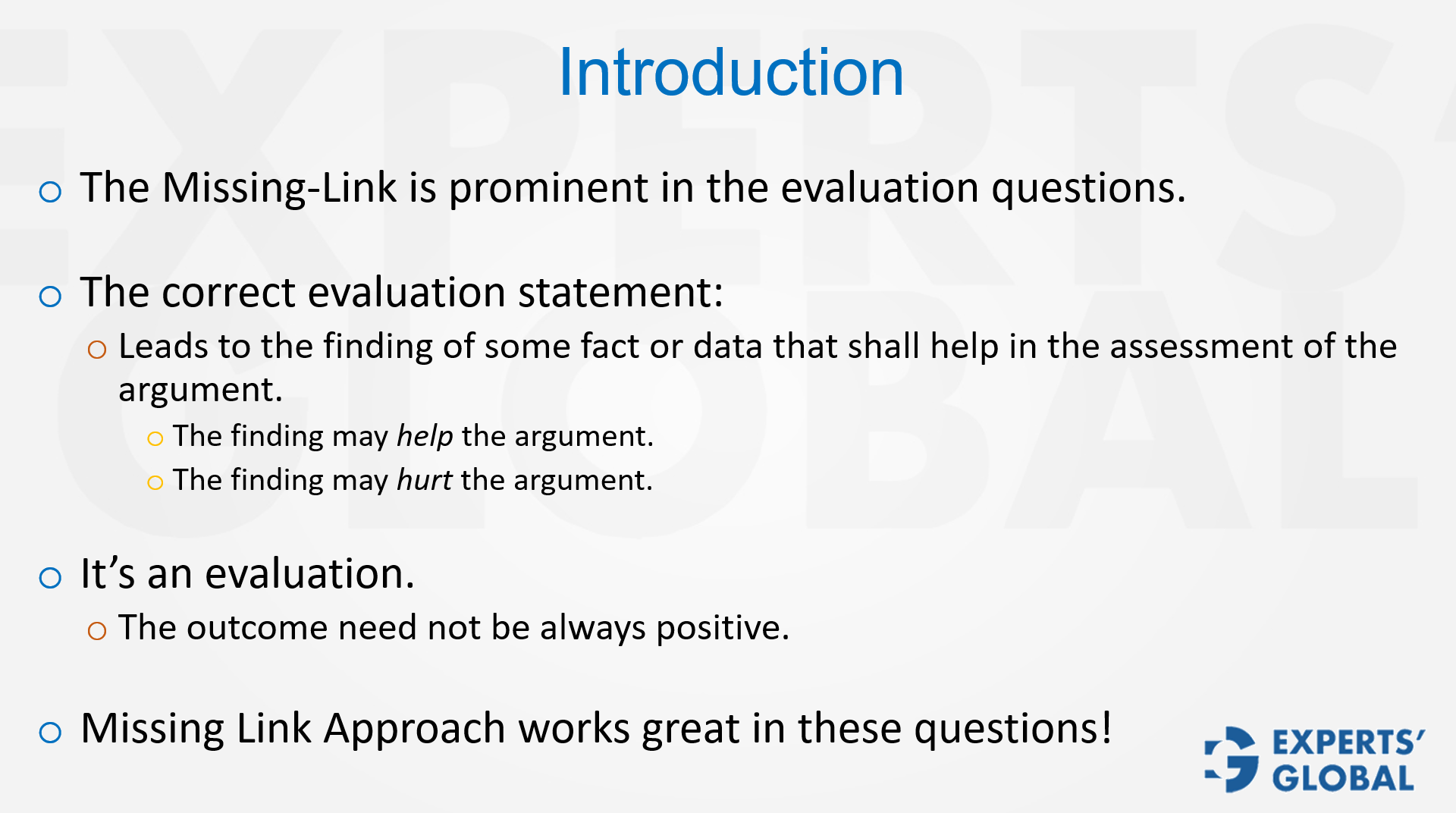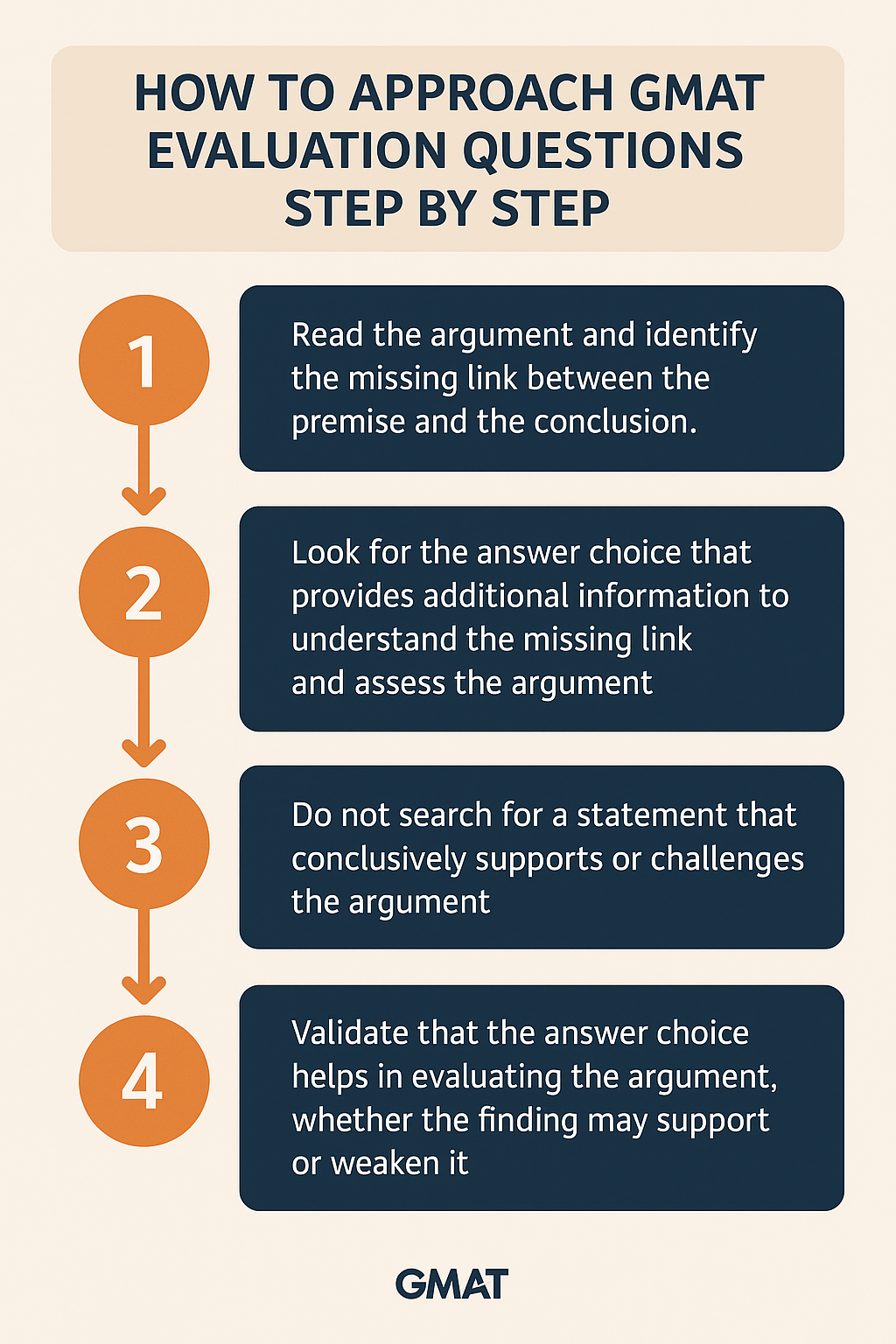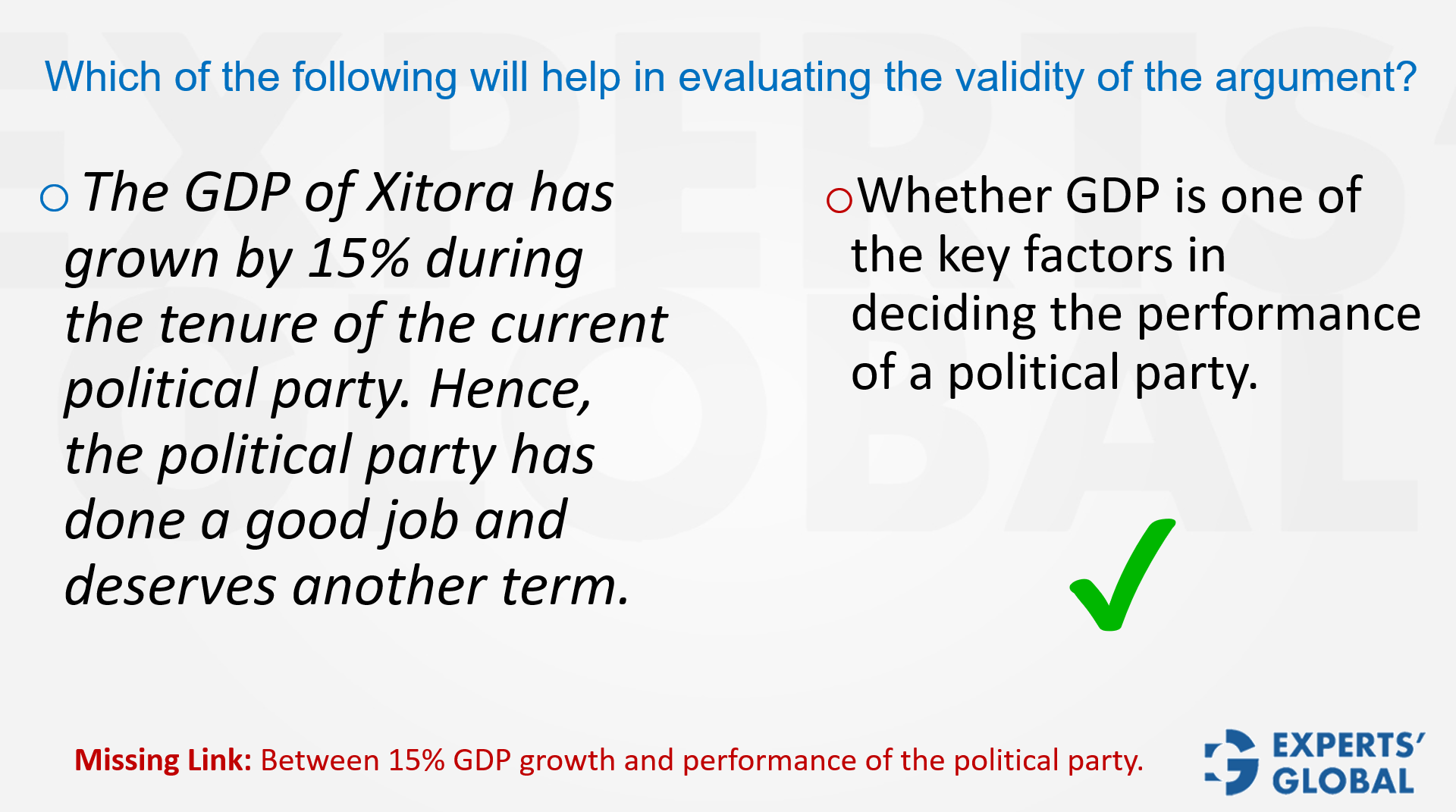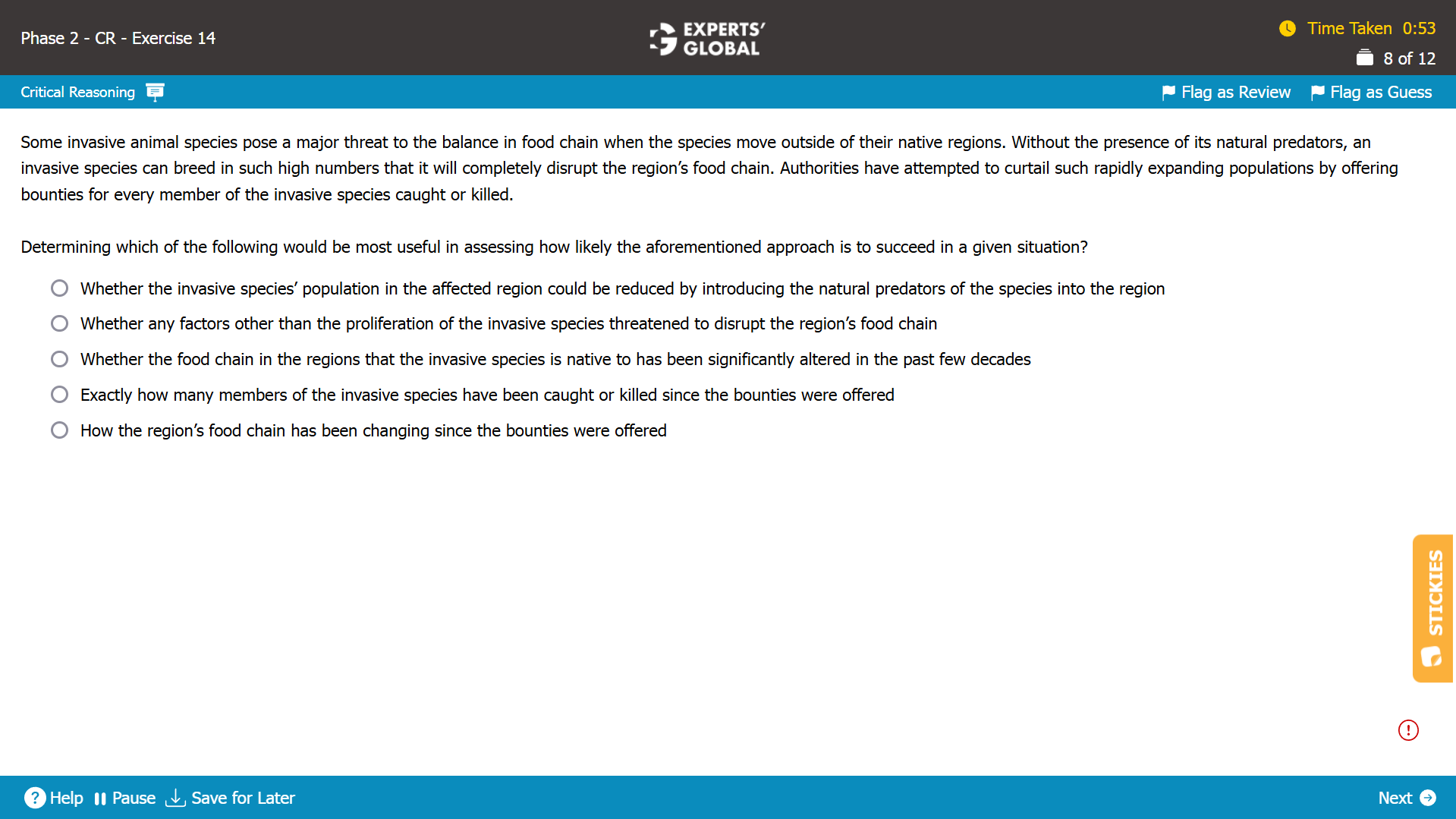Invest 30 seconds...
...for what may lead to a life altering association!
Help Line
- +91.8800.2828.00 (IND)
- 1030-1830 Hrs IST, Mon-Sat
- support@expertsglobal.com
...for what may lead to a life altering association!


Evaluation of an argument questions seek information that tests the link between evidence and conclusion. Identify the gap, then ask which choice clarifies it. In the process of evaluation, the correct answer choice may strengthen or weaken (help or hurt) the conclusion.
Evaluation questions ask for information that would test the link between evidence and conclusion. This overview frames a practical lens: identify the suspected gap, then ask which fact, if known, would most illuminate the argument’s strength or weakness without committing to either. The video introduces the approach; the article organizes common prompts and decision checks for precise reading. The habit supports disciplined analysis during GMAT prep and nurtures objective judgment valued in MBA admissions, where arguments must withstand careful scrutiny.

Evaluation questions occupy a unique place in GMAT Critical Reasoning. While assumption and strengthening questions focus on filling the missing link directly, evaluation questions ask you to consider what extra information would help judge the strength of the argument. The crucial point is that evaluation does not always lead to a positive outcome. Instead, it provides a framework to assess the conclusion more objectively.

Expect a short passage presenting an argument with layers, twists, and turns. Your task is to select the option that best evaluates the reasoning by showing what information would strengthen or weaken it. The correct answer identifies evidence that directly affects the conclusion’s validity, positively or negatively.

In evaluation questions, the missing link is usually clear. The correct evaluation statement must lead to a finding of some fact or data that will help in assessing the argument. Importantly, evaluation is not about validating or confirming the conclusion. It is about gaining clarity that allows us to judge whether the conclusion stands on solid ground.

Consider this argument:
The GDP of Xitora has grown by 15% during the tenure of the current political party. Hence, the party has done a good job and deserves another term.
Question: Which of the following will help in evaluating the validity of the argument?
The missing-link here is between the GDP growth and the conclusion about the party’s performance.
An evaluation statement should not directly declare the conclusion true or false. Instead, it should provide information that helps us assess the link between GDP growth and political performance.
If the answer is yes, the conclusion is strengthened. If the answer is no, the conclusion is weakened.
Either way, the new information helps us evaluate the argument.
If the government did play a significant role, the argument gains strength. If not, the argument weakens.
In both cases, this information helps in evaluation.
The GDP figure on its own might sound impressive, but when placed in context, its significance can change.
If 15% is considered strong in light of the circumstances, the conclusion appears stronger.
If it is inadequate, the conclusion is weaker.
The question itself invites evaluation, not judgment.
Hence, either way, this answer choice helps in evaluation.
Government performance is rarely judged on a single factor.
If the government performed poorly in other critical areas, the conclusion weakens.
If it performed well, the conclusion strengthens.
In either case, we gain an evaluation of the argument’s reasoning.
Evaluation questions teach students to think beyond the surface. They remind us that an argument cannot be accepted at face value; it must be examined against multiple possibilities. The right evaluation statement brings clarity, whether that clarity supports the argument or undermines it.

Show Explanation

Written Explanation
Mind-map: Invasive animals are threat to the balance of food chain in non-native regions → without natural predators, these species grow in high numbers and disrupt food chain → authorities offered bounties for catching invasive animals → offering bounties may curtail rapid expansion of invasive animals (implicit conclusion)
Missing-link: Between authorities offering bounties for catching invasive animals and the conclusion that offering bounties may curtail the rapid expansion of invasive animals
Expectation from the correct answer choice: To indicate some fact or data that helps in evaluating whether offering bounties curtailed the rapid expansion of invasive animals
A. The argument is concerned with whether “offering bounties” to curtain the rapid expansion of invasive animals would be successful; knowing whether the invasive animal population can be curtailed by “other means” such as introducing the invasive animals’ natural predators makes no suggestion regarding the effectiveness of the plan of offering bounties; so, this answer choice would simply provide additional information but not help evaluate the conclusion. Because this answer choice would not help evaluate the conclusion, this answer choice is incorrect.
B. Trap. The argument is concerned with whether offering bounties to curtail the rapid expansion of invasive animals would be successful in preventing disruption of food chain; so, other reasons that may be disrupting the food chain are out of scope. Because this answer choice would not help evaluate the conclusion, this answer choice is incorrect.
C. Comparing the changes in food chains of the invasive species’ native and non-native regions over time makes no suggestion regarding whether offering bounties may curtail the rapid expansion of invasive animals; so, this answer choice would simply provide additional information but not help evaluate the conclusion. Because this answer choice would not help evaluate the conclusion, this answer choice is incorrect.
D. Trap. The argument is concerned with whether offering bounties to curtail the rapid expansion of invasive animals would be successful in preventing disruption of food chain; knowing the exact number of invasive animals caught or killed because of the bounties makes no suggestion regarding whether the bounties may be successful in removing “enough number of invasive animals” to prevent disruption of the food chain; so, this answer choice would simply provide additional information but not help evaluate the conclusion. Because this answer choice would not help evaluate the conclusion, this answer choice is incorrect.
E. Correct. If the food chain in the region has improved/remained stable since the bounties were offered, the population of invasive animals that feed on the food chain has likely decreased, thus indicating the success of the plan; on the other hand, continued disruption in the food chain casts doubt on whether the plan would be effective in curtailing the population of invasive animals; so, this answer choice helps evaluate the conclusion. Because this answer choice would help evaluate the conclusion, this answer choice is correct.
E is the best choice.
Evaluation questions test your ability to judge the strength of an argument by identifying information that clarifies the link between premise and conclusion. The correct answer neither directly proves nor disproves but provides insight into how reliable the reasoning is. Effective evaluation involves asking what fact would most affect the argument’s validity. Practicing this method in GMAT simulations strengthens analytical discipline, helping you navigate uncertainty with clarity and precision under real exam conditions in Critical Reasoning.
Evaluation questions highlight that truth often lies not in quick answers but in the quality of the questions we ask. In GMAT preparation, this mindset fosters the ability to pause, consider alternatives, and weigh evidence with care. In MBA applications, it mirrors the skill of evaluating decisions from multiple perspectives, ensuring choices are grounded in balanced reasoning. In life, too, clarity comes from seeking the information that truly matters. Each GMAT mock becomes an exercise in cultivating this reflectiv